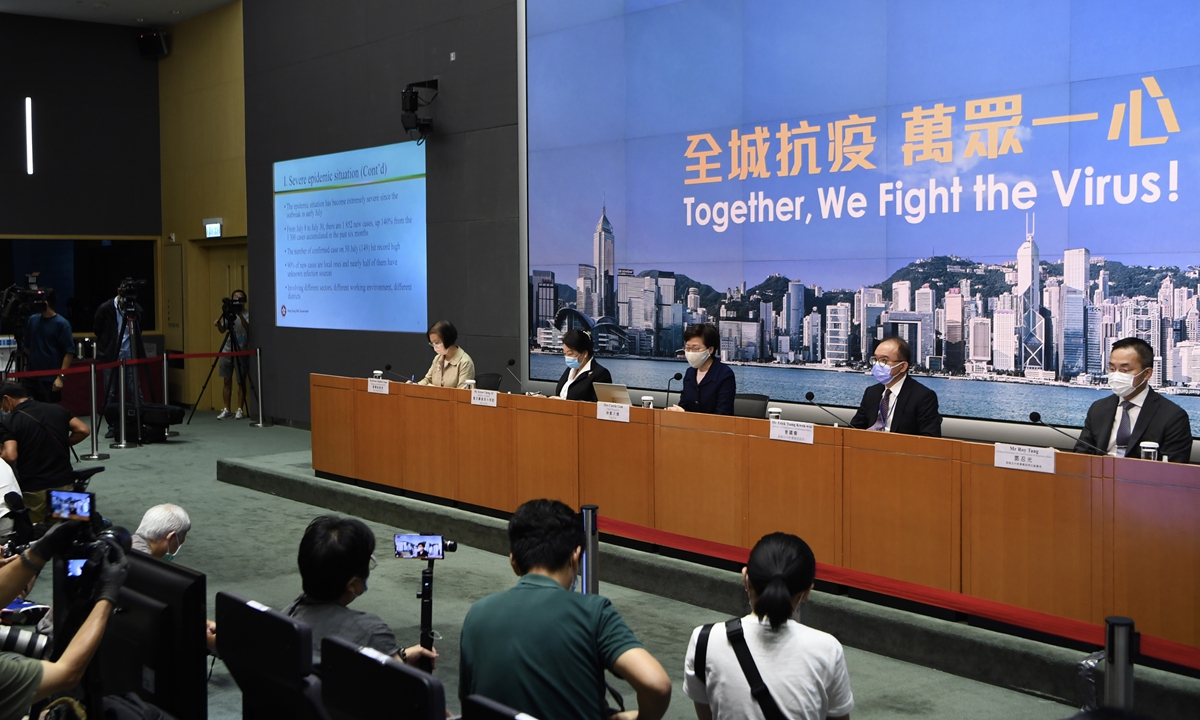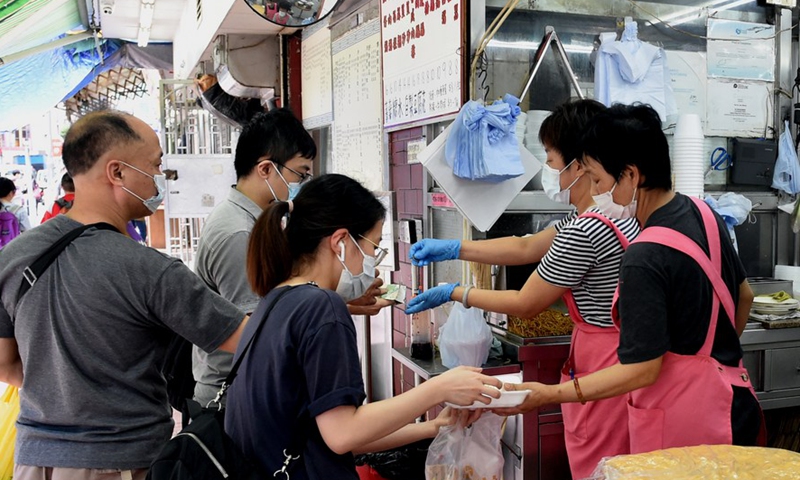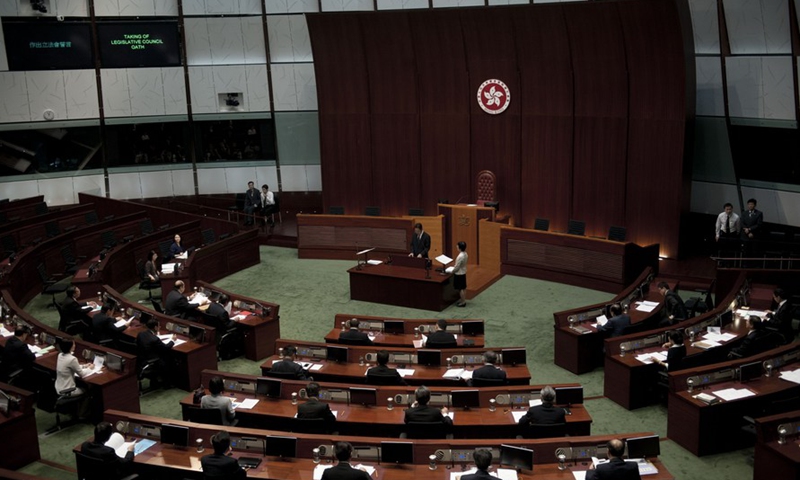HK LegCo election postponed a year, gets central govt support
By GT staff reporters Source: Global Times Published: 2020/7/31 19:58:41 Last Updated: 2020/8/1 19:13:34

Hong Kong Chief Executive Carrie Lam announces on Friday the postponement of the Legislative Council election to September 5, 2021. Photo: cnsphoto
Hong Kong Chief Executive Carrie Lam announced on Friday that due to the current severe COVID-19 situation in the city, the Legislative Council (LegCo) election scheduled for September has been postponed to September 5 next year. Experts and local lawmakers said the decision prioritizes public health and aims to ensure fairness in the election.
Lam announced the decision at a press conference on Friday, saying that it was not made for political reasons, but for public health.
Before the announcement, many residents, politicians and organizations had urged the government to consider postponing the election as the latest wave of COVID-19 has been seriously impacting the city since July.
According to the latest data from the HKSAR public health authority, Hong Kong reported 121 new cases on Friday. That marked the 10th consecutive daily increase of more than 100 cases, bringing the total number of cases confirmed in the city to 3,273.
Lam said that from July 8 to July 30, Hong Kong reported 1,852 new confirmed cases, a 140 percent increase from the total of the previous six months. The city is in the most severe epidemic situation since January, with the risk of a huge outbreak increasing.
Lam also listed several reasons to postpone the election for a year, including that this wave may last weeks or longer; society needs more time to recover; and at least 3 to 4 months are needed to prepare for a new election for fairness.
Wang Guangfa, a respiratory expert at Peking University First Hospital, told the Global Times on Friday that Hong Kong is at a very critical point in curbing the further spread of the virus, and it would see its number of cases reach tens of thousands or even hundreds of thousands if it fails to control the situation in the near future.
If Hong Kong had pushed for the election and let candidates campaign in crowded places, it would have been risky, experts said.
"Hong Kong should prioritize COVID-19 prevention and people's health. Postponing the LegCo election to contain the virus was a wise decision," Wang said.
Top Chinese respiratory expert Zhong Nanshan told media on July 29 that community transmission has emerged in Hong Kong, and prevention is a priority. He suggested Hong Kong restrict group activities and ban illegal assemblies. He also called for large-scale nucleic acid testing in Hong Kong.
The COVID-19 situation has complicated the city's election, seriously impacting people's right to participate in the process, observers said.
HKSAR LegCo Finance Committee Chairman Chan Kin-por told the Global Times that given the worsening coronavirus situation in Hong Kong, whether or not hundreds of thousands of Hong Kong residents working or living in the Chinese mainland and overseas will be able to return in time and cast their vote must be taken into account.
Chan said it would be hard to ensure a fair and just vote if the government pushes the elections forward regardless of the coronavirus situation.
Ip Kwok-him, a Hong Kong deputy to the National People's Congress and an executive councilor, told the Global Times that elections and campaigns can no longer be carried out normally and that the political views of candidates cannot be fully promoted, as the number of confirmed COVID-19 cases in the city has been increasing by over 100 a day for the last few days. Some residents may be reluctant to go out to vote.
Ip said postponing the election is not what they want to do, but has to be made under the current situation.
It was reported that from February to July, at least 67 countries and regions have postponed national or regional elections due to the COVID-19 pandemic. According to a BBC report in March, local and mayoral elections in England were postponed for a year until May 2021 due to the pandemic.
Victor Chan Chi-ho, a candidate for the LegCo election who has prepared for the election campaign since submitting his application, told the Global Times on Friday that he supports the postponement, as he and his campaign team were concerned that the campaign and voting may further spread the virus.
Lawrence Tang Fei, a member of the Chinese Association of Hong Kong and Macao Studies and also a candidate for this year's election, told the Global Times that he also supports the postponement, as daily infections have surpassed 100. "Hong Kong is a populous city. More than 3 million people swarming to more than 600 polling stations as well as other procedures during the election will increase the risk of community transmission."
"More than 60 countries and regions have postponed their elections. Why can't Hong Kong do the same?" he asked.
"The LegCo election should be held amid an atmosphere of peace and stability, so it can better fulfill its responsibilities under the Basic Law," Tian Feilong, a legal expert on Hong Kong affairs at Beihang University in Beijing, told the Global Times. He also noted that the decision was legitimate and reasonable.

File photo:Xinhua
Legal basis
Lam also said that given the severe epidemic situation, the only practicable plan for the HKSAR government is to cite the Emergency Regulations Ordinance, considering infection numbers and the death toll are increasing, and election activities may worsen the epidemic situation.
According to the Legislative Council Ordinance, the chief executive "may, by order, direct the postponement of a general election if, before the holding of the election, the chief executive is of the opinion that the election is likely to be obstructed, disrupted, undermined or seriously affected by riot or open violence or any danger to public health or safety."
The chief executive must specify a date for an election and that date must not be later than 14 days after the date on which the election would have taken place, according to the Legislative Council Ordinance.
Tian said that if the election needs to be postponed for a longer period, the chief executive may also use the Emergency Regulations Ordinance to make regulations for the postponement.
The Emergency Regulations Ordinance states that when the chief executive considers a situation an emergency or public danger, they may make regulations they consider desirable for the interest of the public.
In responding to how to deal with "one year vacuum period" as the four-year term of the current LegCo is about to end, Lam told the conference that she has sought help from the central government.
Tian said that Hong Kong's chief executive can also use Article 11 of the Legislative Council Ordinance to call emergency meetings to deal with important agendas, including policy addresses or financial budgets. But this is a remedy plan and is troublesome.
A more practicable way is that the HKSAR government could submit a plan to the National People's Congress Standing Committee, Tian said.
Some experts suggested to extend the terms of the current LegCo to avoid a "one year vacuum period."
According to a release from the NPC, the 21 plenary meeting of the 13th NPC Standing Committee is scheduled to be held on August 8.
Relevant issues of Hong Kong may be solved during the meetings, observers said.
Lau Siu-kai, vice president of the Chinese Association of Hong Kong and Macao Studies, told the Global Times that although the HKSAR government has the legal basis to postpone the election, its decision will lead to a series of questions that need to be answered. Against the backdrop of Hong Kong's current political and social situation, support from the central government and a judicial interpretation of the decision would help the HKSAR government's work.
China's State Council supports the HKSAR government's decision to postpone the election for a year, noting that the central government will propose that the National People's Congress Standing Committee make a decision on the "one year vacuum period."
The central government said in a release on Friday that it will offer the necessary support for HKSAR in dealing with the COVID-19 epidemic to ensure residents' health and safety.
The Liaison Office of the Central People's Government in Hong Kong expressed understanding and support for the HKSAR government's decision on Friday. "This is a responsible move to protect the citizens' health and safety… it also fits the Constitution, Basic Law, and local laws and regulations."
The Hong Kong and Macao Affairs Office of the State Council said on Friday that the central government has decided to send Chinese mainland testing personnel to Hong Kong to help expand nucleic acid tests and to build a temporary quarantine and treatment center to contain the virus.

LegCo File photo:Xinhua
Dismissing misinterpretations
However, the decision to postpone the election has been misinterpreted by the opposition and foreign media, which claimed the government was using COVID-19 "as an excuse to interfere in the democratic process," according to Hong Kong media reports.
Experts noted that these forces - and the foreign forces behind them - want to use the momentum of 2019's unrest and the illegal "primaries" organized by the opposition earlier in July to force the election as soon as possible, so that they can seize power in the city and paralyze the HKSAR government.
Ip said people's lives should be prioritized over elections, and that certain opposition forces only care about political gains, which is extremely irresponsible.
Regarding the claim that "postponing the election was a trick played by the government and pro-establishment camp as they don't believe they can win," Ip said such speculation was nonsense.
Who residents choose to support in the election may not make a difference in a year, and candidates can use this time to consolidate public support, Ip said.
The negative reactions from certain opposition forces are no surprise, as they know that hundreds of thousands of Hong Kong people in the Chinese mainland and abroad, most of whom support the pro-establishment camp, may not be able to return to vote in time, Chan said.
But the fact that opposition forces disregarding the need for a fair vote reflects their eagerness to seize power and their selfishness in ignoring the risks of COVID-19, Chan said.
Posted in: POLITICS